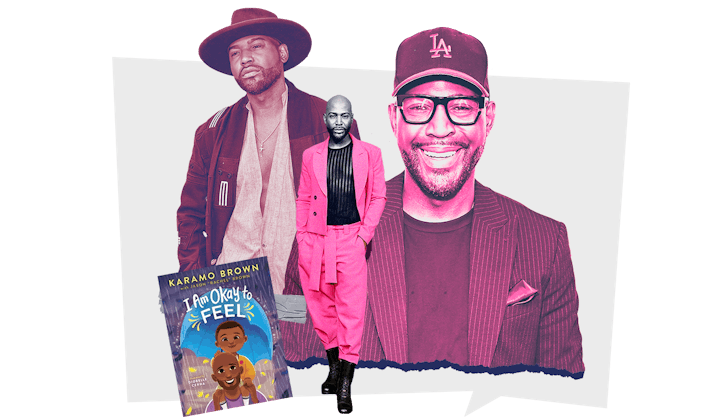‘Queer Eye’ Legend Karamo Brown On The Power Of Brutal Honesty
Karamo Brown helps dads get real with their kids — and everyone else.

Karamo Brown, the 41-year-old reality star, daytime talk show host, and author of three books, just knows how to feel. He’s changed lives as a cast member of Queer Eye by listening to the needs of dudes desperate to live better lives. On his new talk show, Brown councils everyday folk on complicated relationships, marital infidelity, substance abuse, and race. And with his newest book I Am OK To Feel, a sweet volume for kids with adorable illustrations by Diobelle Cerna, co-written with his twenty-five-year-old son, Jason, Brown communicates clearly and tenderly that it’s OK to have feelings and talk about them. Just a few days before his new book’s release, we talked to Brown about the book, his son, and how the truth can set us all free.
What was the inspiration for the book?
Karamo Brown: When I was younger there were so few conversations about understanding our feelings so this book is about being happy or excited or mad and all of those feelings in between and the benefit of talking about feelings. It’s an exercise that helps you get through the day. This book lets you know that it’s OK to feel. It’s an important message because when people ask us how we’re doing, we’re trained to say ‘I’m fine’ because we don’t want to be a burden. But it’s OK to express how you’re feeling inside.
Tell me about writing this book with your son, Jason.
My son is 25 years old, a young man figuring out his life. He came to me when he was ten years old. He was like most kids. At 18 you think you’re getting out of your parents' house. But he was always coming over. Always checking in. Always wanting advice. It never ends. To do this project we came together. I think a black, queer dad talking to his son about feelings is really powerful. We wrote the book in a matter of three hours because of the way we talk. What we ended up with is a book that good for readers aged four to forty. We give real therapeutic exercises in the back.
You launched a talk show just recently. Are you surviving?
It’s going really well. We’re five or six weeks in. It feels like a newborn baby. We shoot five episodes a week and I’m hearing the same things over and over again: hurt, pain, fear. People don’t know how to express themselves and they don’t understand that expressing it is how you get better. And I have to be honest with people; sometimes I tell them, ‘You gotta leave each other. This is unhealthy. You can’t communicate. You’re trauma bonded.’
Does the kind of obligation to be brutally truthful ever feel like a burden?
I don’t think it’s pressure. When God gives you the tools, opportunity, and support it’s a blessing. Our show is about people in conflict, people with real problems. There are moments when it can get heated but have the tools to calm people down. It leads to real dialogue. It’s both sides of an argument.
What about spousal conflict? Relationship conflict? Let’s just say I’m still working from home and my wife is still working from home and we can’t get out of each other's way.
Start by writing some things down. Boundaries. Write down your idea about what quality time together looks like. Do it without the pressure of your partner. Could be organizing the kitchen. Or sex. Or sitting on the couch and watching a movie. Or talking. Or going out. And then you need to talk about what you wrote down and find a common ground.
So many dads seem stuck in time, into IPAs and Pearl Jam. What do you say to those who want to be cool again — plugged into culture like we once were?
Culture is such a weird word. We associate it with music and art and that’s where men get caught up. What culture really means is that you possess a curiosity about the world that surrounds us. Sometimes we stop being as curious as we should be because we’re busy because we have to provide for our families. Putting your head down like that though takes away the meaning away from what it means to live and experience the world. Ask yourself: Are you being curious? Are you finding a community of people who share your values and attitude? Are you finding people who can make you grow?
It’s something that we have to practice. Toxic masculinity tells us that we have to be a certain way. Toxicity occurs when there’s stagnation; when there’s no growth. Toxicity occurs when we choose not to grow. What about if you want to start painting or learning how to bake or cook? It could be anything. Curiosity will make your relationships and community stronger. I encourage men to practice curiosity